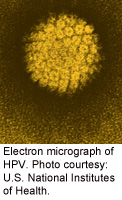Immunization protects against sexually transmitted disease, certain cancers, health experts say
WEDNESDAY, July 15, 2015 (HealthDay News) — Almost a decade after the human papillomavirus (HPV) vaccine was first recommended for girls, only two U.S. states and Washington, D.C., require the immunization, according to a research letter published in the July 14 issue of the Journal of the American Medical Association.
“Our study can’t answer the question of why,” coauthor Jason Schwartz, Ph.D., a bioethics researcher at Princeton University in New Jersey, told HealthDay. “We can only show that there’s a stark difference between HPV and these other vaccines.” But Schwartz speculated that states may not want to revisit the controversy that arose with HPV vaccine approval in 2006.
Virginia and Washington, D.C., are the only jurisdictions that require HPV vaccination. In August, Rhode Island will join them, Schwartz said. In contrast, 29 states and the District of Columbia require the meningococcal vaccine, the researchers note. Forty-seven states and D.C. require the vaccine against hepatitis B. All states require children to be vaccinated against varicella, the study authors added.
In 2013, only 38 percent of U.S. teenage girls and 14 percent of boys had received all three doses of the HPV vaccine, according to the U.S. Centers for Disease Control and Prevention. There are three vaccines that can prevent infection with certain cancer-related strains of HPV: Cervarix, which protects females against genital warts and cervical cancer; and Gardasil and Gardasil 9, which protect against warts and anal cancer in both sexes, as well as vaginal and vulvar cancers, the CDC says. The vaccines cost about $400 for all three doses, but most insurance plans and Medicaid cover them.
Full Text (subscription or payment may be required)
Copyright © 2015 HealthDay. All rights reserved.








